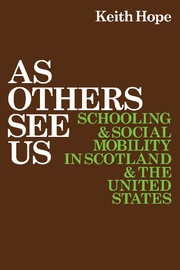Book contents
- Frontmatter
- Contents
- Acknowledgments
- Introduction
- 1 Scotland: A meritelective system?
- 2 Comparison of Scotland with England and Wales
- 3 Comparison of Scotland with the United States
- 4 IQ + effort = merit
- 5 The institutions of managed meritelection
- 6 Was selection carried out fairly?
- 7 Meanings of key terms
- 8 Does deprivation affect life chances?
- 9 Market situation
- 10 Intelligence and occupational mobility
- 11 Intelligence and vertical mobility
- 12 Scottish society
- 13 Understanding other people's norms
- 14 Merit or desert?
- Notes
- References
- Index
- Frontmatter
- Contents
- Acknowledgments
- Introduction
- 1 Scotland: A meritelective system?
- 2 Comparison of Scotland with England and Wales
- 3 Comparison of Scotland with the United States
- 4 IQ + effort = merit
- 5 The institutions of managed meritelection
- 6 Was selection carried out fairly?
- 7 Meanings of key terms
- 8 Does deprivation affect life chances?
- 9 Market situation
- 10 Intelligence and occupational mobility
- 11 Intelligence and vertical mobility
- 12 Scottish society
- 13 Understanding other people's norms
- 14 Merit or desert?
- Notes
- References
- Index
Summary
The modern doctrine of merit, as it is understood in Britain, took root in a swamp of frustration. It was not the ideology of sansculottes, nor was it the revolutionary dogma of an ignorant or reactionary class. On the contrary, it was a product of the heartfelt irritation of the most intellectual, enterprising, and energetic men and women of the day. And what these people were demanding was not money, which was something they had already acquired in good measure and which they spent in moderation; what they wanted was public office, affording them an opportunity to serve the state and a chance to attain public eminence. They perceived that the offices of state were filled by men of modest talents and fitful application and, like expert craftsmen compelled to watch their trade being botched by unhandy numbskulls, they were simply irritated by the waste and inefficiency of it.
The people of whom we speak are the leading members of the middle class toward the end of the eighteenth century, especially that 7 percent or so of the English population who set themselves apart as Dissenters. These men were liberal professionals, sometimes dissenting ministers; they were the leading scientists of their day, and they made up about 40 percent of important British entrepreneurs between 1760 and 1830. Barred from matriculating at Oxford or Cambridge, they were educated in the much superior Dissenting academies, some of which taught the physical sciences.
- Type
- Chapter
- Information
- As Others See UsSchooling and Social Mobility in Scotland and the United States, pp. 250 - 268Publisher: Cambridge University PressPrint publication year: 1985



